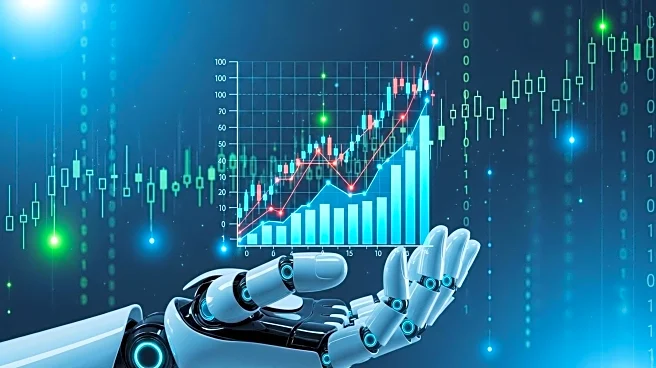What's Happening?
The U.S. stock market has continued to set records despite economic challenges such as a government shutdown, a weakening labor market, and persistent inflation. The S&P 500 and Nasdaq indexes have experienced significant gains, largely driven by investments in artificial intelligence and the anticipation of lower interest rates. The 'Magnificent 7' tech stocks have been pivotal, contributing to a substantial portion of the S&P 500's gains. However, this growth has not translated into widespread job creation, with 2025 on track to be one of the worst years for new payrolls. Economic bifurcation is evident, as wealthier households benefit from stock market gains while lower- and middle-income families face economic strain.
Why It's Important?
The current stock market dynamics highlight a growing divide in the U.S. economy, where wealth accumulation is concentrated among a few, primarily due to AI-driven stock gains. This situation underscores the 'K-shaped' recovery, where different segments of the economy recover at different rates. The Federal Reserve's potential interest rate cuts aim to support hiring, but concerns about inflation persist. The AI investment cycle, while boosting stock values, raises questions about its sustainability and the broader economic impact. The situation presents a precarious balance, where any disruption could lead to a broader economic downturn.
What's Next?
The Federal Reserve is expected to announce further interest rate cuts to stimulate job growth, with investors anticipating at least two more cuts this year. However, the ongoing government shutdown and potential tariff implementations by President Trump could impact economic growth. The AI investment cycle's sustainability remains a concern, with potential implications for companies heavily reliant on AI-driven growth. Economic stakeholders are closely monitoring these developments, as any significant shift could affect the broader market and economic stability.
Beyond the Headlines
The reliance on AI investments raises ethical and economic questions about the concentration of wealth and the potential for a tech-driven economic bubble. The lack of job creation despite economic growth highlights the need for policies that address income inequality and ensure broader economic benefits. The situation also prompts a reevaluation of the role of technology in economic development and the potential risks of over-reliance on a few key sectors.










